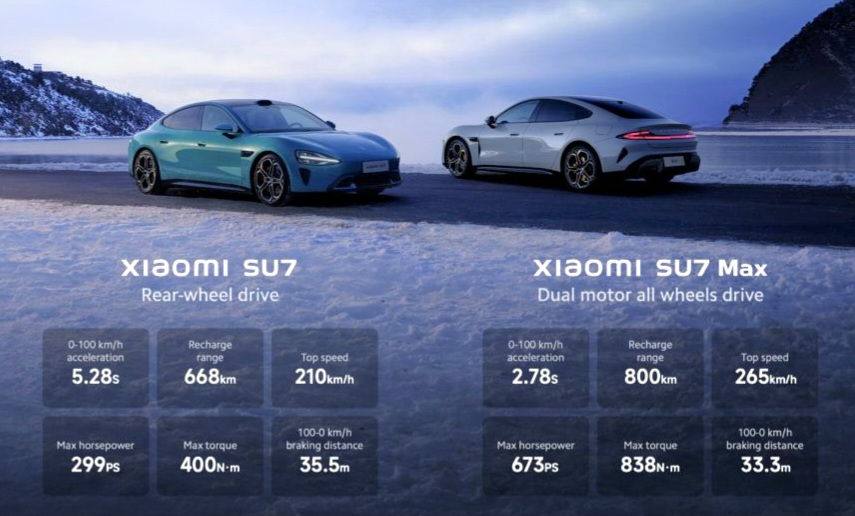Xiaomi, the renowned Chinese electronics manufacturer, launched its debut electric vehicle (EV) Xiaomi SU7 in China on March 28.
Priced at an estimated 300,000 yuan (€38,000, $41,000), the SU7’s competitive pricing aims to challenge international rivals. Interested buyers can place orders for the sporty four-door sedan through a dedicated app.
The new Chinese EV Xiaomi SU7, a high-end electric car, has been described as a Tesla competitor, posing challenges for Elon Musk in the Chinese electric vehicle market. The SU7 has been designed to compete with the likes of Porsche and Tesla via its super electric motor.
The SU7 claims 800 kilometers (500 miles) of range, Xiaomi said.
The move came as China solidified its position as the world’s largest electric vehicle market, largely driven by domestic sales supported by government subsidies.
Xiaomi has ambitious plans to secure a spot among the top five global automakers within the next 15 to 20 years. The company’s vision extends beyond just producing cars. It aims to create a comprehensive “Human x Car x Home” ecosystem by integrating its vehicles with existing products like smartphones, computers, TVs, air purifiers, and tablets.
Tu Le, the founder of Sino Auto Insights consultancy, highlighted Xiaomi’s widespread influence in China, stating, “You probably don’t know anyone in Beijing that doesn’t have at least one Xiaomi product, be it a mobile phone, computer, TV, (air) purifier, or tablet,” the founder of the Sino Auto Insights consultancy Tu Le told AP news agency.
Xiaomi SU7 features
The SU7 comes in three trims: Standard, Pro, and Max. as There’s also a limited-run Founders Edition of 5,000 units.
- Standard variant provides a balanced performance with 299 hp (220 kW) power and 400 Nm torque, achieving 0-100km/h acceleration in 5.28 seconds and a top speed of 210 km/h (130.5 mph). It offers a CLTC range of 700km (435 miles) and fast charge time of 25 minutes.
- Pro variant enhances performance with the same power and torque as the Standard, but with extended CLTC range of 830km (516 miles) and slightly slower acceleration of 5.70 seconds for 0-100km/h. Its fast charge time is 30 minutes, and it maintains a top speed of 210 km/h (130.5 mph).
- Max variant delivers exceptional performance with 673 hp (495 kW) power and 838 Nm torque, enabling rapid acceleration from 0-100km/h in just 2.78 seconds and reaching a top speed of 265 km/h (165 mph). It offers a CLTC range of 800km (497 miles) and a remarkably quick fast charge time of 19 minutes.

Xiaomi SU7 EV is decked out with advanced technology, including a head-up display, Pilot Pro ADAS with vision, a mini fridge add-on, and a Dolby Atmos sound ssystem.
Pricing
| Xiaomi SU7 Trim | Standard | Pro | Max |
| Starting Price | RMB 215,900 ($29,875) | RMB 245,900 ($34,000) | RMB 299,900 ($41,500) |
China’s lower-priced EVs pose challenge to EU and US
While the majority of the industry’s sales have historically remained domestic for China, the world’s largest market for electric vehicle. However, Chinese manufacturers are increasingly penetrating overseas markets with competitively priced models, potentially disrupting established European, Japanese, and American auto giants.
The European Union (EU) is currently investigating Chinese subsidies to determine if they provide an unfair advantage to EVs manufactured in China in overseas markets. Concurrently, the United States has launched a probe into Chinese-made connected cars over concerns about potential data collection of sensitive driver information.
“China’s policies could flood our market with its vehicles, posing risks to our national security. I’m not going to let that happen on my watch,” US President Joe Biden had said expressing his apprehensions about threats posed by China’s automotive industry.
In response to these allegations, China has filed a complaint with the World Trade Organization, claiming that US subsidies for electric vehicles unfairly disadvantage Chinese products.
Despite the regulatory challenges and international scrutiny, Xiaomi remains optimistic about its electric vehicle venture. With its established presence in the tech industry and a clear vision for integration across various product lines, Xiaomi is poised to make a significant impact in the electric vehicle market, both domestically and internationally.
In a related context, the rise of Chinese automaker BYD has been noteworthy. The company’s strategies have led to a surge in its market presence, even outpacing industry giant Tesla in certain markets.